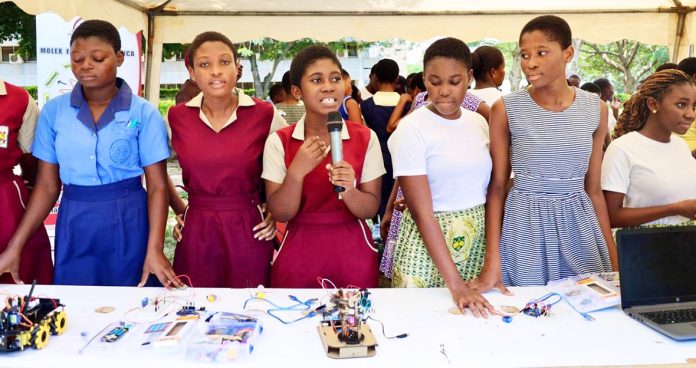The first cohort of about sixty young girls have successfully completed Molex Foundation Africa’s Initiative for Girls in Science, Technology, Engineering and Mathematics education.
The week long training programme, which saw the participants camped at the Superannuation Hostel, at the University of Cape Coast, was meant to fully equip the young girls with adequate skills in Robotics and Artificial Intelligence.

It further included intense mentorship in-STEM and career guidance for the participants which illustrated Molex Foundation Africa’s commitment, to assisting the participants to make informed decisions about their future careers.
Challenges faced by young girls in STEM
The female coordinator of Molxe, Madam Charlotte Owusu-Ansah enumerated some of the major challenges young girls faced in the field of Science Technology Engineering and Mathematics education.
According to her, there was huge gap between men and women in the Ghanaian society in terms of male and female representation in the areas of Science, Technology, Engineering and Mathematics education across the country.
This, she noted, meant that there were less female role models in-STEM for the younger ones to look up to, so as to develop deep interest and to influence their perceptions and influence their career choices.
The scarcity of female role models in the area of STEM, according to her, formed part of Molex’s commitment to empowering young girls at the high schools, who have shown interest in STEM education.
Exhibition of works
At the end of the intensive training, the participants, who went through various stages of the programme demonstrated their practical understanding of what they were taught, and showcased this with the exhibition of project works.
Two young girls – Nana Efua Eduafowa Afful and Tabitha Sharon Scott-Lutterodt – from Mfantseman Girls and Edinaman High Schools respectively, developed Smart Lighting System sensor using LDR and RGB LED.
Their sensor could check the illuminance or the lux level in a room to ensure its adequacy for learning during the night and other usage of light that are especially done in the night.
According to their work, as exhibited, the sensor would give red indication if the light is too high, produce blue indicator when the light is too dark and turn green when the light is normal.
Other project works exhibited by the participants were distance measurement application with ultrasonic sensor, temperature control application and fire alarm application, which were all designed by students.
Engagement with the media
At the exhibition event, which climaxed the weeklong programme, the Chief Executive Officer of Molex Africa, Dr Patrick Essien, stated that Molex was fully committed to assisting young girls who have passion in stem to develop their interest.
Dr Essien mentioned that though the world was gravitating towards AI and Robotics due to advancement in technology, Molex was focused on identifying young girls who have deep passion for STEM.
Dr Essien said “We all agree that STEM is the new way but it will be counterproductive to impose the concept on young girls and force them to pursue STEM programmes at all costs without considering their interest too”.
“So, at Molex, we are committed to inspiring the young ones who have interest in the fields of STEM education to consciously develop their interests so that they can make informed decisions,” he added.
He extended sincere thanks to Henry Luce Foundation for their belief in Molex vision and their generous support adding that “This collaboration exemplifies the power of partnerships in driving positive change”.









